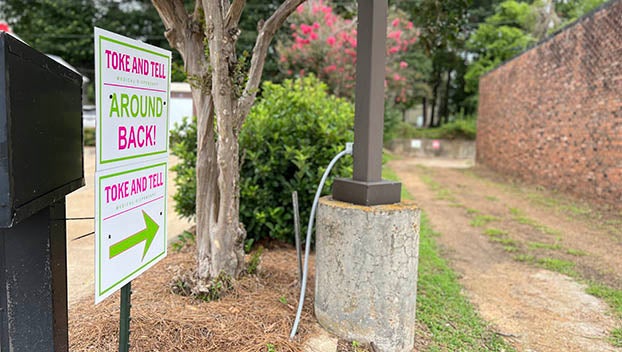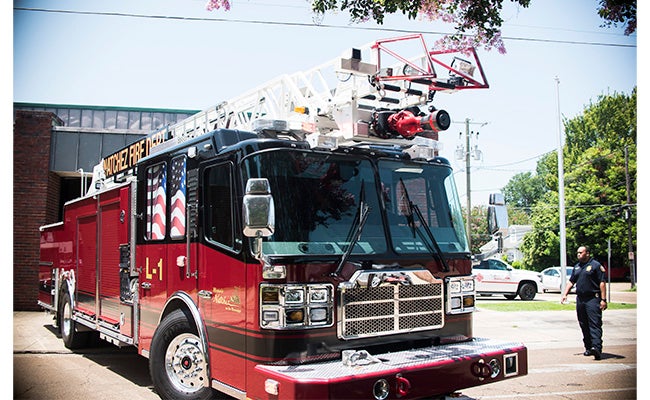Miss-Lou farmers take advantage of Midwest woes
Published 12:49 am Monday, August 20, 2012

LAUREN WOOD / THE NATCHEZ DEMOCRAT — James Fair, far left, uses an air hose to clean dust off of a combine in the field of farmer David Yates’ soybean crop Friday morning on Louisiana 15.
NATCHEZ — It’s been one of the hottest and driest years in U.S. history.
The ongoing drought in the Midwest is wreaking havoc on farmers and their crops. So much so, the U.S. Department of Agriculture has predicted a decrease in supply and a sharp increase in prices.
But don’t tell farmers in the Miss-Lou it’s a down year for crops — particularly corn.
In fact, according to farmers around Concordia Parish, this is one of their best years for corn.
“It’s been a good year for us,” Vidalia farmer David Yates said. “We had a really good spring.
“Prices are extremely high due to the Midwest drought. Their demise has been fortunate for us.”
LSU Ag Center assistant agent for Northeast Louisiana Sebe Brown confirmed it’s been an exceptional year for corn in the Concordia Parish area.
“This year, our farmers were able to plant earlier and get it out of the ground quicker,” Brown said. “Around the region, farmers are reporting around 200-225 bushels (of corn) per acre.”
Those numbers are up from the past two years. In 2010 farmers in Corcordia Parish harvested 110 bushels per acre and 135 bushels per acre in 2011.
Yates said he was yielding 80-85 bushels per acre last year and has harvested as much as 200 bushels per acre this year.
Adams County farmers have also seen a rise in their yields. In 2010, Adams County harvested 104 bushels per acre and 103 bushels per acre in 2011.
Fifth generation Miss-Lou farmer Noble Guedon said it’s been an “OK year” for his family, and they were able to pull in approximately 150-180 bushels per acre of corn this year.
Guedon said he grows his crops without irrigation and his yields depend the amount of rain they receive. Yates, uses irrigation and is able keep his crops watered through the dry periods.
“This has been an exceptionally good year,” Adams County Extension Director David Carter said. “It’s been much better than last year when we were in a record drought.”
According to Bungeservices.com, the cash bids for corn was $7.24 a bushel and soybeans were $16.38 a bushel as of Friday.
“The price for soybeans and corn is exceptionally high,” Carter said. “It’s good for the Miss-Lou.”
Brown said the prices for corn and soybeans could get even higher with the ongoing drought in the Midwest.
“No one could project this at the beginning of the year, and it can be frustrating for some farmers,” Brown said. “The price for corn has reached $8 per bushel and could go higher.”
Brown explained some farmers sold their crops at “locked in” prices at the beginning of the year at prices higher than last year’s but much lower than the current prices.
“Last year, farmers were selling corn for around $4 a bushel and had the opportunity to sell their crops for just over $5 at the beginning of year,” Brown said. “Now they see their neighbors making more off their crops. You don’t ever know what the market is going to do.”
Guedon said just because prices are high doesn’t mean farmers are getting rich.
“The cost to grow has risen,” Guedon said. “Fertilizer is higher. Equipment is higher. Everything cost more.
“Farming is dependent on many things.”
He said factors such as weather, prices and costs change from day-to-day and could affect your whole crop.
The biggest issue for farmers is shipping. With the Mississippi River at record lows, barges are having difficulties hauling loads up river.
“Shipping issues have added to the cost of corn,” Brown said. “These guys are yielding really well, and they are getting turned away at the elevators. They are either too full or can’t unload the trucks fast enough.”
Brown said barges are only able to carry half loads up the river due to weight, and storage space for the corn is becoming tight. It was just another obstacle for a “feast or famine” career, he said.
“We’ve been shipping to the Vidalia location,” Guedon said. “We were fighting a record high river last year, and we are fighting record lows this year.
“It just goes to show there are no perfect years when it comes to farming.”





